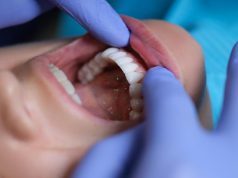Significantly quicker improvement in postoperative dysphagia in oropharyngeal cancer TORS-only group
THURSDAY, Oct. 26, 2017 (HealthDay News) — For patients with oropharyngeal squamous cell carcinoma (OPSCC), transoral robotic surgery (TORS) alone is associated with improved outcomes versus TORS followed by adjuvant treatment, according to a study published online Oct. 26 in JAMA Otolaryngology — Head & Neck Surgery.
Virginie Achim, M.D., from Oregon Health and Science University in Portland, and colleagues compared functional speech, swallowing, and quality-of-life outcomes for those undergoing TORS only and those undergoing TORS and adjuvant radiotherapy (TORS+RT) or TORS and chemoradiotherapy (TORS+CRT). Data were included for 74 patients undergoing TORS for initial treatment of OPSCC and were collected at baseline, postoperatively, and at short- and long-term follow-up.
The researchers found that the response rates were 86, 88, and 86 percent postoperatively and at short- and long-term follow-up, respectively. There was a significant worsening in pain and all swallowing-related measures postoperatively in all three treatment groups. The improvement in postoperative dysphagia was significantly quicker in the TORS-only group. Weight loss differed between the TORS-only and TORS+RT groups and the TORS-only and TORS+CRT groups in a clinically meaningful way at long-term follow-up (mean differences, −16.1 [95 percent confidence interval, −29.8 to −2.4] and −14.6 [95 percent confidence interval, −29.2 to 0], respectively). The TORS-only group had significantly better scores on the Performance Status Scale-Eating in Public scale and Head and Neck Quality of Life-Eating scale than the TORS+CRT group.
“These findings support the investigation of adjuvant de-escalation therapies to reduce the long-term adverse effects of treatment,” the authors write.
Copyright © 2017 HealthDay. All rights reserved.








